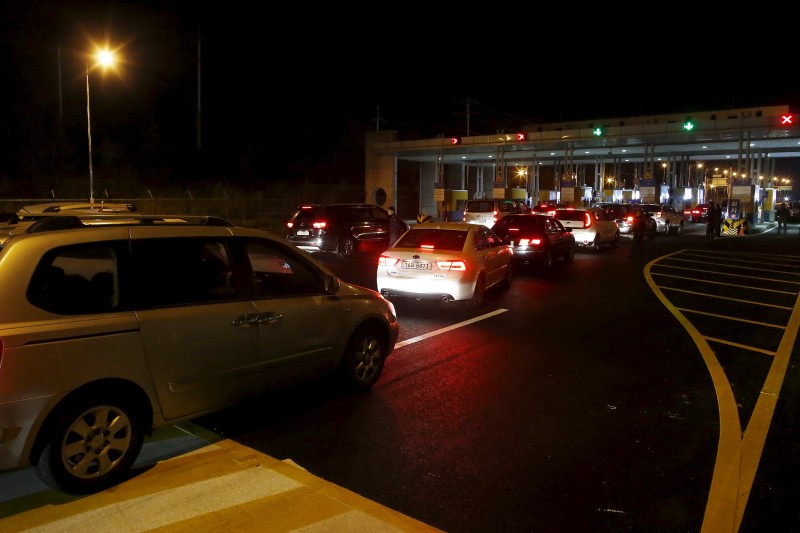By Jack Kim and Ju-min Park
SEOUL (Reuters) - South Korea and the United States are expected to begin talks next week on possible deployment of an advanced U.S. missile defence system following North Korea's recent rocket launch, officials said on Friday, as Seoul cut power to a factory park run jointly with the North.
The discussions would focus on placing one Terminal High Altitude Area Defence (THAAD) system with the U.S. military in South Korea, a South Korean defence official told Reuters on condition of anonymity.
Pentagon spokesman Commander Bill Urban said in an email that a joint working group would "review all aspects regarding the potential of deployment of a THAAD system to South Korea."
"We expect the first meeting to occur next week," he said.
North Korea launched a long-range rocket on Feb. 7 carrying what it called a satellite, drawing renewed international condemnation just weeks after it carried out a nuclear bomb test.
It said the launch was for peaceful purposes, but Seoul and Washington have said it violated United Nations Security Council resolutions because it used ballistic missile technology.
North Korea carried out a nuclear bomb test last month, also banned by a U.N. resolution.
On Wednesday, South Korea suspended operations at the Kaesong industrial zone as punishment for the rocket launch and nuclear test. The zone, just inside North Korea, had operated for more than a decade.
The North on Thursday called the action "a declaration of war" and expelled the South's workers. Kaesong was the last venue for regular interaction between the divided Koreas.
The 280 South Koreans who had remained in Kaesong rushed to leave the industrial park on Thursday evening, completing the pullout at 11:05 p.m. (1405 GMT), according to the South's Unification Ministry, which handles relations with the North.
A few minutes before midnight, the South shut off the supply of electricity into Kaesong that powered the factory zone, the ministry said early on Friday. It also cut the water supply.
The United States, Japan and South Korea are seeking tougher U.N. sanctions against North Korea in the wake of the nuclear test and rocket launch.
CHINESE, RUSSIAN CONCERNS
Wang Yi, the foreign minister of China, North Korea's neighbour and main ally, said on Friday that Beijing supported a U.N. Security Council resolution to make Pyongyang "pay the necessary price" for the launch.
He also expressed concern over a possible U.S. deployment of its sophisticated THAAD missile defence system to South Korea, saying it could also be used to target China.
U.S. military officials have said the THAAD system is needed in South Korea, but Seoul had been reluctant to openly discuss its deployment given the risk of damaging ties with China, its biggest trade partner.
Russia has also expressed concern about the potential deployment of THAAD, saying it could trigger an arms race in Northeast Asia.
South Korea and the United States have said the system, built by Lockheed Martin Corp (N:LMT) and designed to intercept and destroy ballistic missiles inside or just outside the atmosphere during their final phase of flight, would be focussed only on North Korea.
South Korea accused North Korea of "illegal" acts by freezing the assets of South Korean companies in Kaesong, and warned that Pyongyang would be held responsible for any consequences from the industrial park's suspension.
The Kaesong project employed about 55,000 North Koreans, who were given a taste of life in the South, working for the 124 mostly small- and medium-sized manufacturers that operated there, about 54 km (34 miles) northwest of Seoul.
Except for Kaesong, both countries forbid their citizens from communicating with each other across their heavily armed border.

Despite volatile North-South relations, Kaesong had been shut only once before, for five months in 2013 amid heightened tensions following Pyongyang's third nuclear test.